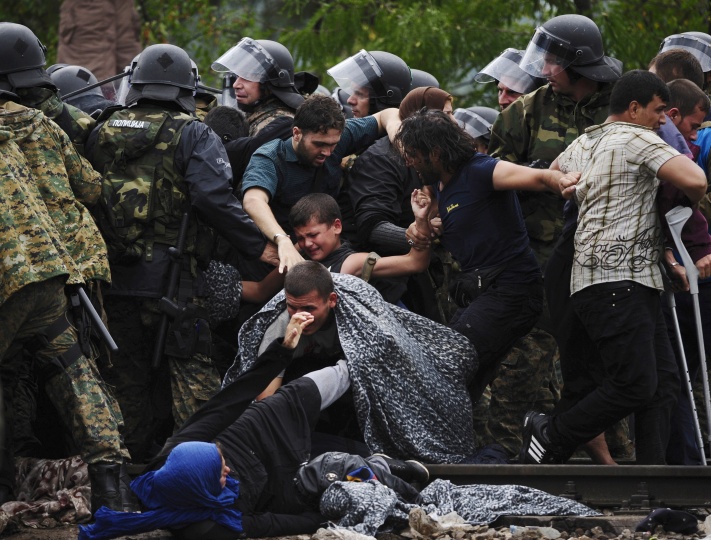Migrants or Refugees: What's the Right Word?

This weekend, after I reported on scenes of desperation at the Greece/Macedonia border as Syrians, Afghans and others scrambled to cross, there was nearly as much outrage about the use of language as the plight of the people.
I called them “refugees”, but the headline on our story used the word “migrant”, a catch-all term to describe all those trying to cross into the EU during this summer of mass movement.
Here’s a sample of the reaction:
@cathynewman @lindseyhilsum if most of them are, shouldn't you be calling them refugees rather than migrants?
— Summer (@cutanddried) August 22, 2015
@sara66750 @lightacandleOTM @cathynewman @cjnu1 @lindseyhilsum No "migrant" crisis in Med Refugees fleeing unimaginable misery and danger
— Summer (@cutanddried) August 22, 2015
@cathynewman @cutanddried @lindseyhilsum migrants choose where these go. Refugees have no choice. Often fleeing conflict or persecution.
— Piers Awramenko (@Its_Piers) August 22, 2015
The Oxford Dictionary defines a migrant as “a person who moves from one place to another in order to find work or better living conditions”. That sounds neutral, but the meaning has twisted in the eyes of many.
“It has evolved from its dictionary definitions into a tool that dehumanises and distances, a blunt pejorative,” wrote Barry Malone, the online editor of Al Jazeera, which no longer uses the term.
I hate to relinquish a useful word because others misinterpret it but I’m struggling with this one. Most of the people I met on the train from the Macedonian town of Gevgelija to the Serbian border were Syrians, fleeing places torn apart by Bashar al Assad’s barrel bombs or the predations of the Islamic State.
Who knows her future? She's a refugee watching the #Macedonian countryside go past on the way to #Serbia. pic.twitter.com/ysxWshdt2J
— Lindsey Hilsum (@lindseyhilsum) August 23, 2015
Where will they get a welcome in Europe? Refugees on the train through #Macedonia. pic.twitter.com/pFnDn6Ov78
— Lindsey Hilsum (@lindseyhilsum) August 23, 2015
In my book, they’re refugees (more on that definition later). But what about the three Nigerians who had been working as cleaners in Istanbul, lost their jobs, and were heading north looking for better opportunities? They claimed they were fleeing Boko Haram, but they came from the capital, Abuja, not the area controlled by the jihadis, so that would be like fleeing France because of the Charlie Hebdo attacks.
By the dictionary definition, then, they’re migrants. I see no shame in that – I too have travelled looking for work and adventure. But when I lived in Kenya in the 1980s, cobbling together a living as a freelance journalist, people called me an ‘expat’ not a migrant. The latter word is rarely used for people from wealthy western countries.
Let’s go back to the beginning. If it weren’t for migration, humankind would never have have colonised the earth – God said “go forth and multiply”, he didn’t say “whatever you do, stay put and, if you must have kids, don’t leave the Garden of Eden or surrounding neighbourhood”.
Since then, everyone has moved everywhere and DNA tests show that we all have mixed ancestry. But, as EU citizens see their privileges and benefits increasingly restricted, they fear there’s not enough to go round.
That’s not unreasonable, but nor is it a licence to dehumanise those who embody our fears. The Nigerians on the train and other West Africans I met in the Misrata detention centre in Libya are economic migrants. I think they should go home and build their own countries – it’s not practical for everyone to come to Europe. But they’re humans, and they’re doing what humans have always done, so why should they be despised?
At the #Greece #Macedonia border. pic.twitter.com/UCAVd4Qyvb
— Lindsey Hilsum (@lindseyhilsum) August 22, 2015
Refugee kids at the #Greece #Macedonia border. It's closed - only a few getting through. pic.twitter.com/NkxjsMYxUK
— Lindsey Hilsum (@lindseyhilsum) August 22, 2015
As for the Syrians, strictly speaking, according to law, they should claim asylum in the first country they reach, which would be Turkey, Jordan or Lebanon. But those countries can’t cope with the four million who have arrived, and richer countries – with the notable exception of Germany – are refusing to establish organised programmes of resettlement.
Many Syrians I’ve met fled thinking they’d be able to go home after a few weeks or months, but as the war shows no sign of easing, they see the rest of their lives stretching ahead. Their houses have been destroyed and family members killed. They want their children to study and work not sit around idle in a tent forever. So of course they try to get to the EU illegally if the EU refuses to admit more than handful by legal means.
Back to the terminology. Migrant shouldn’t be a term of abuse, but increasingly it’s seen that way so I personally am going to stop using it except when there’s really no alternative. Refugee I will use as I always do to describe someone fleeing conflict, however many countries they’ve passed through.
And when I’m not sure, because I don’t know the whole story, I think I might just call them people. Because that’s what they are, whatever the motive for their journey.

































































































